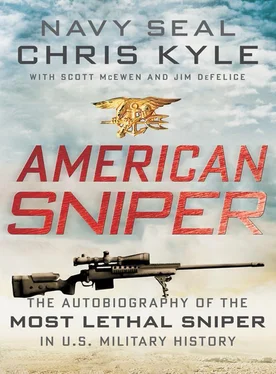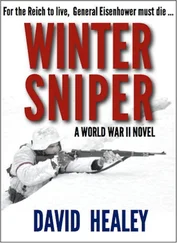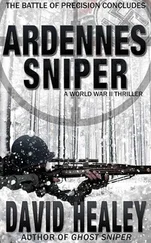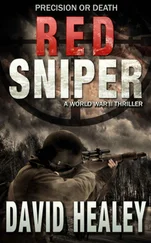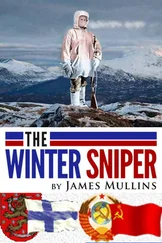We were pissed. We went out expecting to be scouting for a week. We had plenty of fuel, water, and food, and had already figured out how to get resupplied if we needed to. Hell, we could have gone all the way to Baghdad, which at the moment was still in Iraqi hands.
We reported back to base, dejected.
That wasn’t the end of the war for us, but it was a bad sign of what lay ahead.
You have to understand: no SEAL wants to die. The purpose of war, as Patton put it, is to make the other dumb bastard die. But we also want to fight.
Part of it is personal. It’s the same way for athletes: an athlete wants to be in a big game, wants to compete on the field or in the ring. But another part, a bigger part I think, is patriotism.
It’s the sort of thing that if it has to be explained, you’re not going to understand. But maybe this will help:
One night a little later on, we were in an exhausting firefight. Ten of us spent roughly forty-eight hours in the second story of an old, abandoned brick building, fighting in hundred-degree-plus heat wearing full armor. Bullets flew in, demolishing the walls around us practically nonstop. The only break we took was to reload.
Finally, as the sun came up in the morning, the sound of gunfire and bullets hitting brick stopped. The fight was over. It became eerily quiet.
When the Marines came in to relieve us, they found every man in the room either slumped against a wall or collapsed on the floor, dressing wounds or just soaking in the situation.
One of the Marines outside took an American flag and hoisted it over the position. Someone else played the National Anthem—I have no idea where the music came from, but the symbolism and the way it spoke to the soul was overwhelming; it remains one of my most powerful memories.
Every battle-weary man rose, went to the window, and saluted. The words of the music echoed in each of us as we watched the Stars and Stripes wave literally in dawn’s early light. The reminder of what we were fighting for caused tears as well as blood and sweat to run freely from all of us.
I’ve lived the literal meaning of the “land of the free” and “home of the brave.” It’s not corny for me. I feel it in my heart. I feel it in my chest. Even at a ball game, when someone talks during the anthem or doesn’t take off his hat, it pisses me off. I’m not one to be quiet about it, either.
For myself and the SEALs I was with, patriotism and getting into the heat of the battle were deeply connected. But how much a unit like ours can fight depends a lot on leadership. Much of it is up to the head shed, the officers who lead us. SEAL officers are a real mix. Some are good, some are bad. And some are just pussies.
Oh, they may be tough individuals, but it takes more than personal toughness to be good leaders. The methods and goals have to contribute to the toughness.
Our top command wanted us to achieve 100 percent success, and to do it with 0 casualties. That may sound admirable—who doesn’t want to succeed, and who wants anyone to get hurt? But in war those are incompatible and unrealistic. If 100 percent success, 0 casualties are your goal, you’re going to conduct very few operations. You will never take any risks, realistic or otherwise.
Ideally, we could have done sniper overwatches and undertaken scouting missions for the Marines all around Nasiriya. We could have been a much bigger part of the Marines’ drive. We might have saved some of their lives.
We wanted to go out at night and hit the next big city or town the Marine Corps was going to pass through. We’d soften the target for them, killing off as many bad guys as we could. We did do a few missions like that, but it was certainly a lot less than we could have done.
Ihad never known that much about Islam. Raised as a Christian, obviously I knew there had been religious conflicts for centuries. I knew about the Crusades, and I knew that there had been fighting and atrocities forever.
But I also knew that Christianity had evolved from the Middle Ages. We don’t kill people because they’re a different religion.
The people we were fighting in Iraq, after Saddam’s army fled or was defeated, were fanatics. They hated us because we weren’t Muslim. They wanted to kill us, even though we’d just booted out their dictator, because we practiced a different religion than they did.
Isn’t religion supposed to teach tolerance?
People say you have to distance yourself from your enemy to kill him. If that’s true, in Iraq, the insurgents made it really easy.
The fanatics we fought valued nothing but their twisted interpretation of religion. And half the time they just claimed they valued their religion—most didn’t even pray. Quite a number were drugged up so they could fight us.
Many of the insurgents were cowards. They routinely used drugs to stoke their courage. Without them, alone, they were nothing. I have a tape somewhere showing a father and a girl in a house that was being searched. They were downstairs; for some reason, a flash-bang went off upstairs.
On the video, the father hides behind the girl, afraid that he’s going to be killed and ready to sacrifice his daughter.
They may have been cowards, but they could certainly kill people. The insurgents didn’t worry about ROEs or court-martials. If they had the advantage, they would kill any Westerner they could find, whether they were soldiers or not.
One day we were sent to a house where we had heard there might be U.S. prisoners. We didn’t find anyone in the building. But in the basement, there were obvious signs that the dirt had been disturbed. So we set up lights and started digging.
It wasn’t long before I saw a pants leg, then a body, freshly buried.
An American soldier. Army.
Next to him was another. Then another man, this one wearing Marine camis.
My brother had joined the Marines a little before 9/11. I hadn’t heard from him, and I thought that he had deployed to Iraq.
For some reason, as I helped pull the dead body up, I was sure it was my brother.
It wasn’t. I said a silent prayer and we kept digging.
Another body, another Marine. I bent over and forced myself to look.
Not him.
But now, with each man we pulled out of that grave—and there were a bunch—I was more and more convinced I was going to see my brother. My stomach tightened. I kept digging. I wanted to puke.
Finally, we were done. He wasn’t there.
I felt a moment of relief, even elation—none of them were my brother. Then I felt tremendous sadness for the murdered young men whose bodies we had pulled out.
When I finally heard from my brother, I found out that even though he was in Iraq, he hadn’t been anywhere near where I’d seen those bodies. He’d had his own scares and hard times, I’m sure, but hearing his voice just made me feel a lot better.
I was still big brother, hoping to protect him. Hell, he didn’t need me to watch over him; he was a Marine, and a tough one. But somehow those old instincts never go away.
At another location, we found barrels of chemical material that was intended for use as biochemical weapons. Everyone talks about there being no weapons of mass destruction in Iraq, but they seem to be referring to completed nuclear bombs, not the many deadly chemical weapons or precursors that Saddam had stockpiled.
Maybe the reason is that the writing on the barrels showed that the chemicals came from France and Germany, our supposed Western allies.
The thing I always wonder about is how much Saddam was able to hide before we actually invaded. We’d given so much warning before we came in, that he surely had time to move and bury tons of material. Where it went, where it will turn up, what it will poison—I think those are pretty good questions that have never been answered.
Читать дальше
